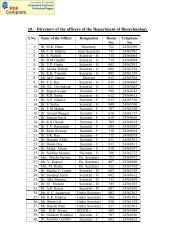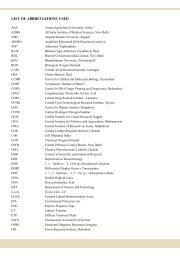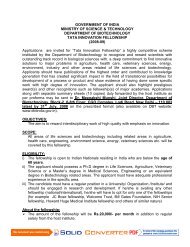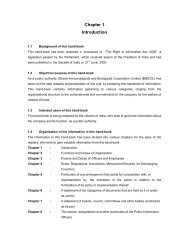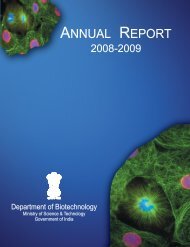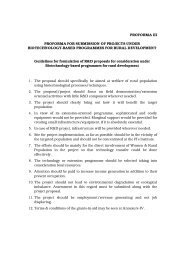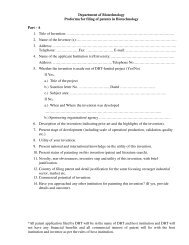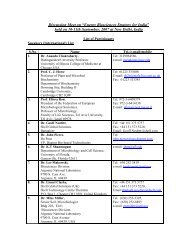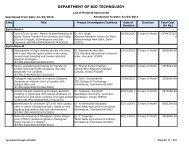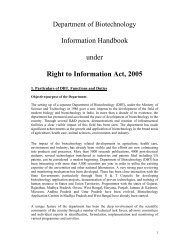ANNUAL REPORT - Department of Biotechnology
ANNUAL REPORT - Department of Biotechnology
ANNUAL REPORT - Department of Biotechnology
Create successful ePaper yourself
Turn your PDF publications into a flip-book with our unique Google optimized e-Paper software.
Operational guidelines for collection,<br />
characterization and production <strong>of</strong> quality planting<br />
material have been brought out. All accessions<br />
collected are being finger printed and superior<br />
accessions are being conserved at NBPGR, New<br />
Delhi. This is the first scientific documentation <strong>of</strong><br />
superior germplasm. Work has also been initiated on<br />
multi-locational trials <strong>of</strong> the superior accessions<br />
collected in terms <strong>of</strong> increased yield and oil quality.<br />
R&D programmes are being initiated for<br />
improvement <strong>of</strong> Jatropha; studies include marker<br />
assisted selection, prospecting <strong>of</strong> genes associated<br />
with oil production pathway, metabolic pathway<br />
engineering etc.<br />
Programmes have also been supported for testing<br />
the potential <strong>of</strong> other tree borne oil seeds<br />
standardizing plant production technologies and<br />
transesterification. Seeds <strong>of</strong> Heynea trijuga, Sapium<br />
sebiferum, Aleurites moluccana, Mesua ferrea and<br />
Pongamia pinnata were collected, processed to<br />
separate the kernels and oil extracted and estimated<br />
from seeds / kernels. Physico-chemical properties <strong>of</strong><br />
the oils were determined. The methyl esters<br />
prepared from the oils were analysed by GLC to<br />
determine the fatty acids composition. Heynea<br />
trijuga oil has been evaluated at IIP for bi<strong>of</strong>uel<br />
properties and has shown encouraging results.<br />
Trans-esterification <strong>of</strong> curcas oil on a pilot scale (10<br />
kg batch) has been carried out at IIP, Dehradun. Use<br />
<strong>of</strong> Pongamia, Salvadora and Madhuca as a raw<br />
material for biodiesel has been studied at NBRI,<br />
Lucknow. Agrotechnology package for cultivation<br />
has been worked out.<br />
In a study supported at CFTRI, Mysore, indigenous<br />
Botryococcus braunii strains were isolated from<br />
fresh water samples collected from Kodaikanal,<br />
Chennai, Mamallapuram and purified and identified<br />
them as A race based on their hydrocarbon pr<strong>of</strong>iles.<br />
All the strains were established in autotrophic<br />
medium and growth pr<strong>of</strong>iles were studied. All the<br />
indigenous strains produced long chain<br />
hydrocarbons <strong>of</strong> C to C chain length as major ones<br />
22 33<br />
DBT Annual Report 2006-07<br />
130<br />
and higher than C at low proportion. Cultivation <strong>of</strong><br />
33<br />
B.braunii strain was scaled up to 100 L level in both<br />
circular and race way ponds and further to 1000L and<br />
3000L in raceway ponds under out door conditions,<br />
which is a major achievement. B.braunii growth and<br />
hydrocarbon production in outdoor ponds was<br />
evaluated in different seasons and maximum<br />
biomass (2 gL-1) was obtained during Oct-Dec and<br />
Feb-Apr. Hydrocarbon production correlated with<br />
biomass yields and maximum hydrocarbon content<br />
28% (w/w) was observed during winter season (Nov-<br />
Dec) using three-phase partitioning system.<br />
Conditions for lipase production from Pseudomonas<br />
cepasia strain have been optimized. Reusability <strong>of</strong> P.<br />
cepasia lipase immobilized on celite in the laboratory<br />
has also been studied at IIT, New Delhi. It was found<br />
that same could be used four times without loss in<br />
activity. P. cepasia was found to give high<br />
transesterification activity. 97-99% conversion <strong>of</strong><br />
Jatropha oil by celite immobilized P. cepasia lipase<br />
towards biodiesel production.<br />
Since Bi<strong>of</strong>uels is one <strong>of</strong> the identified priority areas, it<br />
becomes imperative to have improved Jatropha<br />
plantation which provides raw material for biodiesel<br />
production. A brain storming session was held in the<br />
department to identify priorities in biodiesel and<br />
bioethanol. Under biodiesel, the focus is on : An<br />
integrated breeding programme for developing<br />
mapping populations including polyploidy and<br />
induced mutation for genetic improvement, marker<br />
assisted selection, development <strong>of</strong> micro-satellite<br />
markers for fingerprinting <strong>of</strong> elite genotypes and<br />
markers for yield and oil content and quality. Gene<br />
based association mapping study will also be taken<br />
up with an emphasis on oil content and quality.<br />
Besides, prospecting <strong>of</strong> genes associated with oil<br />
production pathway; metabolic pathway engineering<br />
for improved oil production will also be looked into.<br />
Bioethanol<br />
Various projects have been supported to produce<br />
ethanol using alternate feed stocks as a raw material.<br />
Sweet sorghum, lignocellulosic wastes, fruit &



